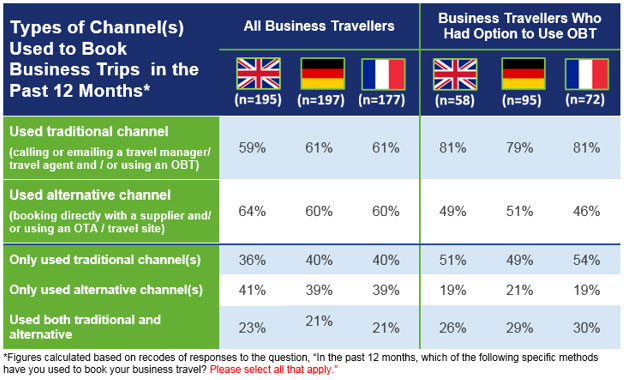February 22, 2016By: Newswire
A new GBTA Foundation survey of business travelers who are based in Europe’s three largest business travel markets—the United Kingdom, Germany and France—shows that 3 out of 5 travelers in each country booked a business trip through a “traditional channel,” while a similar share used an “alternative channel,” in the past year. Of those who had access to a corporate online booking tool (OBT), roughly four out of five used a traditional channel, while about half used an alternative channel, in the same period.

The survey, Booking Behaviour: The Business Traveler’s Perspective, sponsored by Concur, also revealed differences by company size and travel policy. Employees of large companies are most likely to use traditional channels, as larger companies appear more likely to have these channels available, and require travelers to use them. Even at large companies, however, nearly half of business travelers in each country have used an alternative channel to book at least one trip in the past year. When employees are required to follow mandated travel they are also more likely to use traditional channels, while those encouraged to follow guidelines are more likely to use alternative channels.
“Business travelers in the UK, Germany and France book through a diverse number of booking channels and this survey showed that even when travelers have OBT access, they commonly book directly with alternative channels,” said Monica Sanchez, GBTA director of research. “Travel buyers and their programs should keep this in mind and address the exceptions to the rule when booking outside of the corporate channels and put in place a clear protocol to ensure duty of care responsibilities are met.”
“This GBTA study highlights the fact that EMEA employees frequently need to book travel directly with suppliers, which represents a significant challenge for their employers,” said Tim MacDonald, executive vice president of travel for Concur. “Unmanaged, out-of-channel bookings can undermine a travel program’s savings benefits, policy enforcement, duty-of-care obligations and supplier contract commitments. The good news is that with the right tools, companies can acknowledge and manage bookings in alternative channels occurring today without encouraging more supplier direct bookings.”
When asked why they booked outside of their company’s preferred booking channel, business travelers most commonly answered better pricing, the ability to earn loyalty status and more convenience. Even when travelers use alternative channels, they may still book with their company’s preferred suppliers. They most commonly use non-preferred suppliers when they find a more convenient option, when a preferred supplier is not available and when they find a cheaper price somewhere else.
While business travelers use alternative channels for a variety of reasons, the survey shows many prefer using OBTs as almost half of all travelers indicate a corporate online booking tool as their “most preferred,” booking choice, even if they could use any method. In general, when travelers have OBT access, a majority use an OBT in many situations or always. This is especially true in France (80 percent), compared with the United Kingdom (63 percent) and Germany (52 percent). However, in each country, at least one-fifth of these business travelers say they use their OBT in some situations or never.
Methodology
An online survey was conducted of 741 business travelers in the United Kingdom, Germany, and France. The survey was conducted by the GBTA Foundation using a business travel panel. Fielding took place from October 26, 2015, to November 2, 2015. Respondents qualified if they were employed (full-time or part-time), worked for a company that “required (them) to follow (its) published and enforced travel policies” or “encouraged (them) to follow general guidelines” for travel, and had traveled at least twice for business in the past year.
Source: Booking Behaviour: The Business Traveler’s Perspective
What do you think of this $type?










